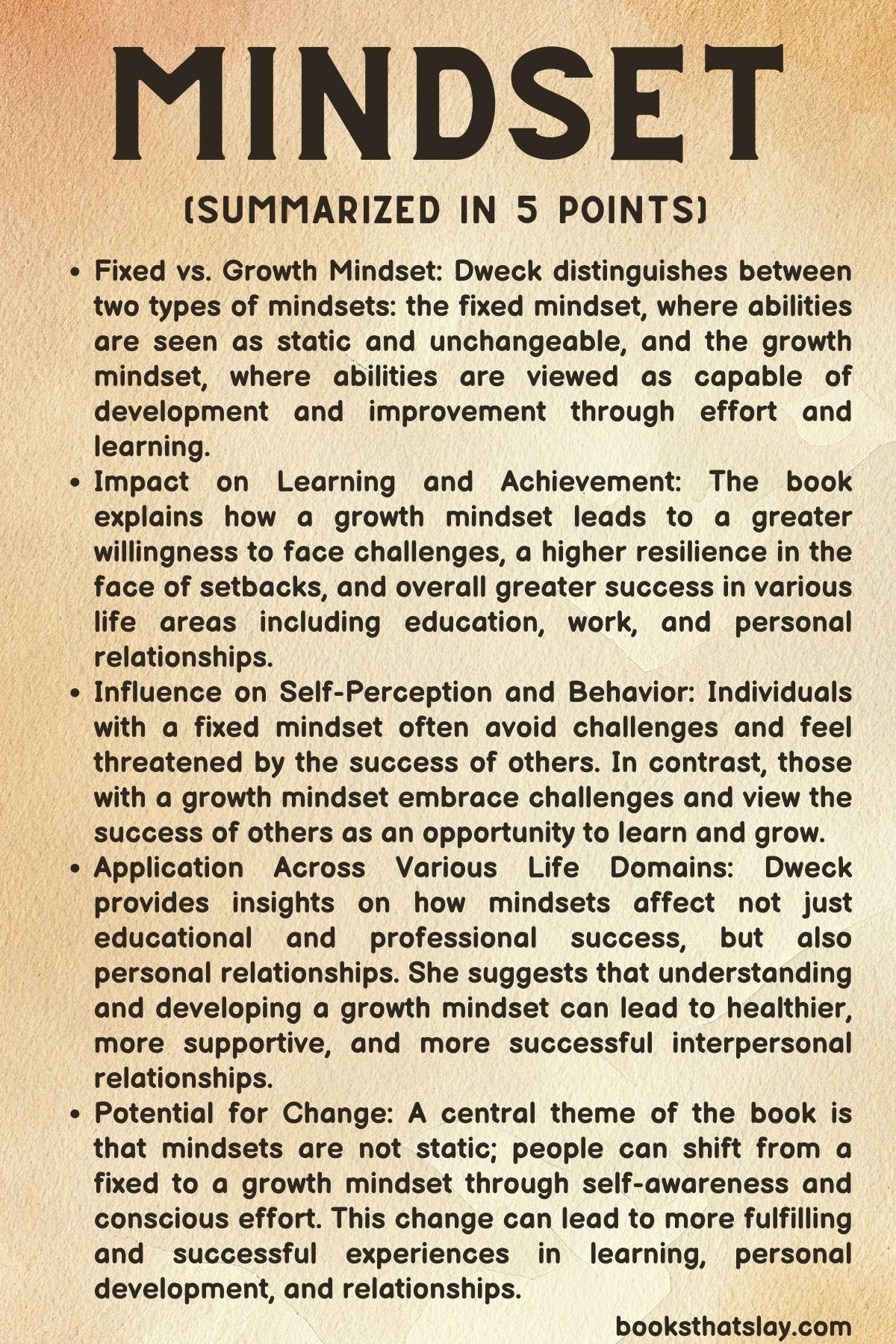Mindset Summary and Key Lessons | by Carol Dweck
“Mindset: The New Psychology of Success” is a groundbreaking book by psychologist Carol Dweck that explores how our beliefs about our abilities can impact our lives profoundly.
Dweck, a renowned psychologist, introduces the concept of two mindsets: the fixed mindset and the growth mindset. With compelling research and real-life examples, she illuminates how our beliefs about our abilities and intelligence profoundly impact our achievements, relationships, and personal development.
Mindset Book Summary
As mentioned before, the book emphasizes two types of mindsets: the fixed mindset and the growth mindset. Dweck lays out her argument by contrasting these two mindsets and explaining their impacts on various aspects of personal and professional life.
Fixed Mindset
People with a fixed mindset believe that their traits, including their intelligence and talents, are fixed and unchangeable.
These people often feel the need to prove themselves over and over, as they equate every situation and challenge as a direct measure of their worth.
They believe that success is about being more gifted than others, leading to a fear of failure, avoidance of challenges, and a tendency to ignore useful negative feedback.
Growth Mindset
People with a growth mindset, on the other hand, believe that their abilities and intelligence can be developed through effort, learning, and persistence.
They view challenges as opportunities for growth and are more resilient in the face of obstacles. They understand that effort is a necessary means for mastery and learn from criticism.
Success, to them, is about stretching themselves to learn something new and to continuously develop.
Throughout the book, Dweck uses examples from her research and other real-world situations to illustrate these mindsets. She covers several domains, including education, business, sports, and relationships, to demonstrate how adopting the right mindset can lead to success.
For instance, in the field of education, Dweck presents evidence that students who hold a growth mindset are more likely to excel academically than those with a fixed mindset. These students relish challenges, understand the value of effort, and view failure as an opportunity to learn.
In business, she presents cases of leaders with either mindset and how this affected their leadership style and the overall health of the organization. Leaders with a growth mindset tend to foster better teamwork, employee engagement, and more innovative cultures compared to those with a fixed mindset.
Towards the end of the book, Dweck offers practical advice on how readers can cultivate a growth mindset in themselves, their children, and their organizations.
She emphasizes that developing a growth mindset is not just about effort but also requires a change in how we think about challenges and failures.
The book concludes with the idea that embracing a growth mindset can help individuals and societies achieve their full potential.

Key Lessons
1. The Power of a Growth Mindset
A growth mindset allows individuals to embrace challenges, persist in the face of setbacks, and view effort as a necessary path to mastery.
Dweck cites numerous examples in her book, such as the case of students who, instead of being limited by a fear of not being smart enough, were able to improve their grades and their enjoyment of school by adopting a growth mindset.
2. The Role of Effort in Mastery
Dweck emphasizes the importance of effort in achieving mastery in any field.
Those with a growth mindset understand that talent is only the starting point and that consistent hard work and practice are necessary for success.
For instance, Mozart, often considered a ‘natural’ genius, actually worked relentlessly, composing over a thousand pieces before his death.
The message is clear: Even for the most naturally gifted, effort is crucial for success.
3. The Impact of Praise
Dweck explores the effects of praise on a child’s development and finds out that praising intelligence or talent, common practices in many households and schools, can foster a fixed mindset.
This may lead to a fear of challenges and mistakes because they threaten the ‘smart’ or ‘talented’ self-image.
On the other hand, praising effort, strategies, focus, and perseverance nurtures a growth mindset, encouraging children to learn and improve, even when tasks are difficult.
4. Coping with Setbacks and Failures
Dweck states that setbacks and failures are not the end but, in fact, are a crucial part of the learning process.
Those with a growth mindset do not perceive failures as defining their worth. Instead, they see them as opportunities for learning and growth.
The example of famous basketball player Michael Jordan, who was cut from his high school basketball team, serves as a poignant reminder that setbacks can become a powerful drive for progress, provided we have the right mindset.
5. The Malleability of Your Mind
Perhaps one of the most empowering insights from Dweck’s work is that mindsets are not static but changeable.
Individuals with a fixed mindset can shift towards a growth mindset, and vice versa.
The key lies in self-awareness, recognizing our fixed-mindset triggers, and consciously cultivating a growth mindset.
Dweck provides various techniques, such as replacing fixed-mindset language with growth mindset language, and understanding that setbacks and effort are part of the process of learning and mastery.
Final Thoughts
“Mindset: The New Psychology of Success” offers valuable insights into how our self-perceptions can command our lives.
By understanding and adopting the growth mindset, we can facilitate personal growth, enhance our performance, and improve our resilience, leading to a more successful and fulfilling life.
Read our other summaries